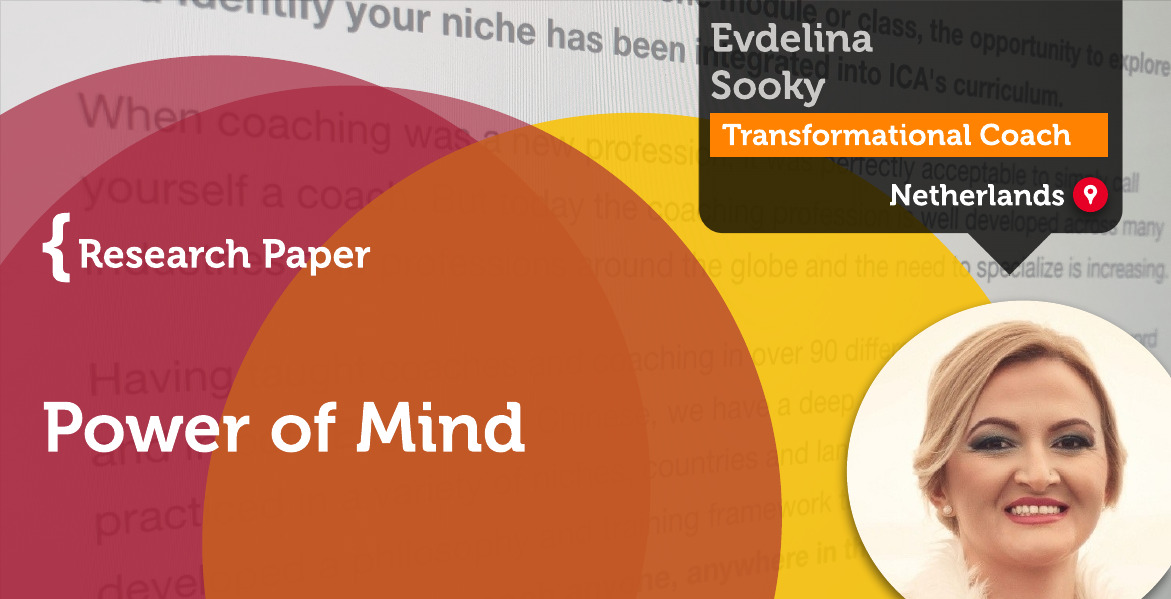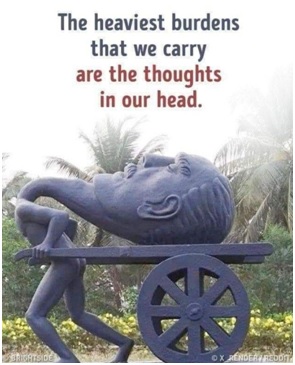Research Paper By Evdelina Sooky, Transformational Coach, NETHERLANDS

Power of (Underlying) Belief
Before I started my coaching journey I was already interested in the power of mind and self-growth. I was sure that I know a lot and that I am supporting myself. But how wrong I was. With coaching, I have learned that what I was missing was knowledge about underlying beliefs and no matter are they positive or negative, they are our saboteurs. I have learned that the power of the mind is so strong that we should always be aware of our thought and our emotions.
Mindpower is one of the strongest and most useful powers you possess.
This power of the mind, together with your imagination, can create success or failure, happiness or unhappiness, opportunities or obstacles. This depends on your mindset.
Whatever your mind can conceive and believe, it can achieve.–Napoleon Hill
Creating Happy Mind
Many studies are done about the brain and the power of the brain. Humankind is still not using the full potential of the brain. All the studies are agreed on one: the brain is super powerful and using that power has a great impact on our life. From us depends in which direction will story of our life go. One of the examples of fantastic power of the mind is next one:
People Can “Think” Their Way to Releasing Weight
This experiment involved a Harvard psychologist and a group of mostly overweight hotel maids. Despite exceeding the recommended amount of exercise, 67% of the maids did not consider themselves physically active. Langer, the psychologist, predicted that the maid’s viewpoints on their physical activity made it difficult for them to lose weight. To test her hypothesis, Langer gathered half of the maids, took their physical measurements, and explained that they were exceeding the amount of exercise recommended by the surgeon general. The other half received no information. After a month, Langer’s team returned to the hotel for reevaluation. The maids that were evaluated, and given information had a decrease in systolic blood pressure, weight, and waist-to-hip ratio. The other group’s results were insignificant. Langer attributes these physical (and likely psychological) benefits to a simple change in mindset https://www.powerofpositivity.com/
From early childhood our mind getting information, data and most of all beliefs which are product of family genetics (something which is transferring from generation to generation), surroundings (you should do this on this way because everybody is doing it on this way), country where are you coming from (everybody in our country is getting married at 25, everybody is doing this/that). All the information which are coming into our mind are having an impact on our lives, no matter positive or negative, they can be on our way to find real purpose and real happiness. It takes a lot to look at our inner self and most of all to realize that our beliefs are our saboteurs. Some beliefs, for sure, do good in our lives in the short run. Maybe they support us in one period, but we should learn to let them go when they longer do not serve us and having a positive impact. In the example above, with maids, we can see how their beliefs about their weight and activity are changed because they changed their mindset and accepted a new way of thinking which lead them to the results.
Definition of Belief Merriam-Webster:
1. a state or habit of mind in which trust or confidence is placed in some person or thing
her belief in God
a belief in democracy
I bought the table in the belief that it was an antique.
contrary to popular belief the beliefs of the Catholic Church
2. something that is accepted, considered to be true, or held as an opinion: something believed
an individual’s religious or political beliefs
especially: a tenet or body of tenets held by a group
3. conviction of the truth of some statement or the reality of some being or phenomenon especially when based on examination of evidence
belief in the validity of scientific statements
As a product of beliefs, we can have doubts about ourselves, our worth, our knowledge, etc.
I can not be successful because I do not deserve to be. I am not good enough therefore I can not have my dream job. I am too fat, too ugly, too weak, too skinny, too smart, too good for that position, I am too beautiful to be in a relationship with that person.
We can see here that even positive beliefs can have a bad impact on our life because they are the product of the outside, not our insight.
Facing Your Change
The realization that a person is not happy and that change needs to happen can be very painful but at the same time very relieving. That is a starting point for a new, better life. The role of the coach is very serious and takes great responsibility to support the client to reach his/her full potential and relies on him/herself from all mind-created obstacles.
The first step would be to support the client to learn to be aware of his/her thoughts. Once the client recognizes that thoughts are products of negative beliefs, the client can start to look and solve the current situation differently.
For example, say that your thought is that “nobody at work likes me”. The process might look like this:
If it’s true that nobody at work likes me, it means there is something wrong with me. If it’s true there is something wrong with me, it means I am flawed. If that’s true, it means I’m never going to be as good as my colleagues. If that’s true, it means I am the worst. If I’m the worst, it means I’m worthless. Oh goodness, that feels like a punch to the gut. That’s my core belief – that I’m worthless. https://www.harleytherapy.co.uk/

Here we can see that most of the thoughts which are not serving us, having beliefs that need more attention and exploration. Once the client reaches and recognizes his core belief, like in the example above, the client can take a look at a situation from another angle and change perspective about the situation which is standing in his way to reach true potential and to have a happy life.
What is needed is a will and consistency in practice to change old patterns and thoughts.
What we are today comes from our thoughts of yesterday, and our present thoughts build our life of tomorrow: Our life is the creation of our mind. Buddha.